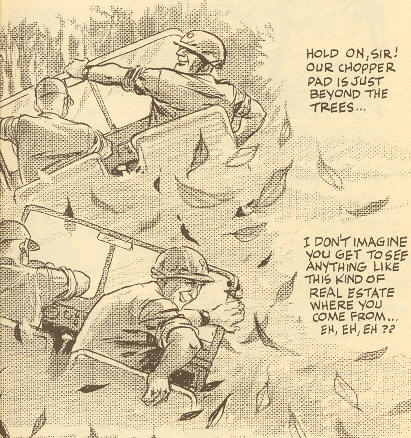|
GENRES:
War memoirs; nonfiction
AUDIENCE:
Adults, teens; adult situations
SYNOPSIS:
Will Eisner spent a considerable amount of time either in the
military or working with them as a civilian contractor (he drew
a comics-style teaching magazine called Army Motors and
later developed P.S. Magazine). This book contains six
reminiscences from his various stints, which spanned World War
II to Vietnam.
- "Last Day in Vietnam" concerns an experience Eisner
had in Vietnam, where his job was to "visit field units
and pick up maintenance stories from automotive and armament
shops." Arriving at the camp "Bearcat," he meets
his escort, a cheerful, talkative major who brings him to a chopper.
The major is in very good spirits because this is his last day
in Vietnam, and he hasn't had a scratch. Along the way, the chopper
stops to pick up three sullen snipers, who are later unloaded
elsewhere. At the base camp, things quickly deteriorate when
the Viet Cong start attacking the perimeter. The major and Eisner
rush to the dispatch shack, but nothing's going out until morning.
The major's mood turns from cheer to despair; he's sure he's
going to buy it on his last day.
- "The Periphery" is a short piece, set in Saigon
and narrated by a "native guide," who points out the
behavior of the reporters in Saigon. They dispassionatly exchange
rumors and news, "like reporting a football match."
But two more come in from the field, having been covering Khe
Sanh, and while one tells the others about the action, the other
sits by himself, drinking. The war became much more personal
for him in Khe Sanh....
- "The Casualty" is entirely wordless. A wounded
soldier, sitting in a bar, bitterly recalls how he got his left
hand blown off--and it wasn't in the field, either.
- "A Dull Day in Korea" finds an impatient West Virginian
lieutenant itching for some real action. His unit is several
miles from the DMZ and doing nothing but patrols. As he reiterates
his life to Eisner, including tales of hunting with his drunken,
abusive father, he spies a "mommasan" cutting wood
on the hillside across the valley. He starts shooting at her,
but misses--and he can't figure out why another officer takes
his gun away just as he's drawing a bead.
- "Hard Duty" follows a real hard case in Korea:
a huge man who loves "killin'"--loves it too much,
so they transferred him to shop duty. After he's finished for
the day, he invites Eisner to come up the hill with him for some
"hard duty" that turns out to be quite a surprise.
- "A Purple Heart for George" is the only story that
came from Eisner's actual camp duty. George, a clerk, has a lover,
Benny, who's a combat soldier. Every Sunday night, George gets
drunk, regrets being a clerk, and writes up a letter requesting
a transfer to a combat unit. His friends, knowing that George
neither wants a transfer nor even remembers that he wrote the
letter when he sobers up, always make sure to tear up the request,
because the captain automatically approves all transfer requests.
However, his friends are both going away for extended periods,
so they enlist another clerk, Hal, to tear up the letter. When
they get back, they find that George has been shipped out--Hal
had been away on a three-day pass. "It was nobody's fault,"
says Hal, unconcerned. And the news out of Burma isn't good....
The book also includes a three-page introduction and historical
photographs in between each of the stories.
EVALUATION:
Is there anyone better than Will Eisner? The guy is almost 84,
and there still isn't anyone better than him. His artistic technique
never fails to take my breath away, even in small, subtle things.
If you don't feel like you're moving right along with the men
in "Last Day in Vietnam" as the jeep lurches through
the jungle or the helicopter takes off, rises, and falls, you're
most likely blind. Note the composition of "The Periphery"
as the one reporter slowly starts dominating the panels, with
the others growing smaller and smaller until they fade away.
 |
|
Lurch, lurch, lurch. |
|
Copyright 2000, Will Eisner |
He's pretty decent at understanding people too. The clueless
hillbilly in Korea, the major in Vietnam who goes from cheerful
to despairing to relieved, the quiet distress of George's friends
and the Khe Sahn reporter... in just a few pages the Master sketches
out fully believable people. He thus gives these short pieces
a great deal of depth.
My one quibble with the book concerns the narrative dialogue
in a few of the pieces, notably "A Purple Heart for George."
To explain the situation, the characters talk between themselves
about things they've known about for a long time, in language
better suited to conversation with strangers (i.e., the readers)
than to language in private. For example, when the two clerks
protecting George find his usual Sunday letter, one of them tears
it up ad says "He does this every weekend... doesn't even
know that he wrote it." They don't have to say this;
they know it. If they'e been doing this for some time,
they'd likely just look for the letter, grunt, and tear it up.
Since the conversation with Hal explains the same stuff in a
more realistic way, nearly all the dialogue during the tearing-up
scene could have been excised.
But this is a small point in an otherwise splendid work. Highly
recommended for those interested in wartime reminiscences; of
course, it's a necessity for Eisner collections and fans. I just
wish it was longer! Note that the roughest word in the book is
"crap" and there are no direct scenes of combat, but
this stuff may be too heavy for kids; probably too subtle for
them, if nothing else. Also, there's a bit of period racism,
used with tact--there's just enough to convey the flavor of the
times. |


